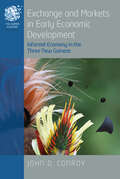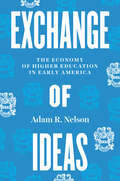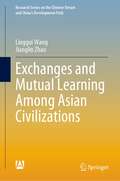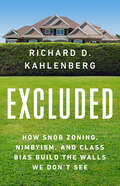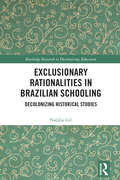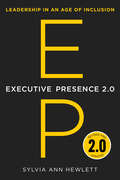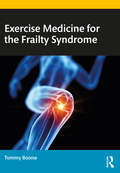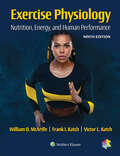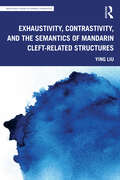- Table View
- List View
Exchange and Markets in Early Economic Development: Informal Economy in the Three New Guineas (The Human Economy #10)
by John D. ConroyThe idea of an informal economy emerged from, and is a critique of, the ideology of ‘economic development’. It originated from Keith Hart’s recognition of informal economic activity in 1960s Ghana. In the context of four colonialisms – German, British, Australian and Dutch – this book recounts Hart’s effort in 1972 to introduce the informal ‘sector’ into development planning in Papua New Guinea. This was problematic, because ‘the market’ was scarcely institutionalized, and traditional modes of exchange persisted stubbornly. Rather than conforming with post-colonial economic ideology, the subjected people pushed back against imposed bureaucracy to practice informal and hybrid modes of economic activity.
Exchange of Ideas: The Economy of Higher Education in Early America
by Adam R. NelsonThe first volume of an ambitious new economic history of American higher education. Exchange of Ideas launches a breathtakingly ambitious new economic history of American higher education. In this volume, Adam R. Nelson focuses on the early republic, explaining how knowledge itself became a commodity, as useful ideas became salable goods and American colleges were drawn into transatlantic commercial relations. American scholars might once have imagined that higher education could sit beyond the sphere of market activity—that intellectual exchange could transcend vulgar consumerism—but already by the end of the eighteenth century, they saw how ideas could be factored into the nation’s balance of trade. Moreover, they concluded that it was the function of colleges to oversee the complex process whereby knowledge could be priced and purchased. The history of capitalism and the history of higher education, Nelson reveals, are intimately intertwined—which raises a host of important and strikingly urgent questions. How do we understand knowledge and education as commercial goods? Who should pay for them? And, fundamentally, what is the optimal system of higher education in a capitalist democracy?
Exchanges and Mutual Learning Among Asian Civilizations (Research Series on the Chinese Dream and China’s Development Path)
by Jianglin Zhao Linggui WangThis book consists of global scholars’ views on mankind’s wishes for the future, the Belt and Road Initiative, bilateral cooperation, inter-civilization exchanges, and mutual learning among Asian civilizations, which represent a critical way to boost the construction of an Asian community with a shared future and a community with a shared future for mankind. It also gives some insight into the future development of Asian civilizations. The book aims to present a diverse and balanced overview on the prospect of Asian development.
Excluded: How Snob Zoning, NIMBYism, and Class Bias Build the Walls We Don't See
by Richard D KahlenbergAn indictment of America's housing policy that reveals the social engineering underlying our segregation by economic class, the social and political fallout that result, and what we can do about it The last, acceptable form of prejudice in America is based on class and executed through state-sponsored economic discrimination, which is hard to see because it is much more subtle than raw racism. While the American meritocracy officially denounces prejudice based on race and gender, it has spawned a new form of bias against those with less education and income. Millions of working-class Americans have their opportunity blocked by exclusionary snob zoning. These government policies make housing unaffordable, frustrate the goals of the civil rights movement, and lock in inequality in our urban and suburban landscapes. Through moving accounts of families excluded from economic and social opportunity as they are hemmed in through &“new redlining&” that limits the type of housing that can be built, Richard Kahlenberg vividly illustrates why America has a housing crisis. He also illustrates why economic segregation matters since where you live affects access to transportation, employment opportunities, decent health care, and good schools. He shows that housing choice has been socially engineered to the benefit of the affluent, and, that astonishingly the most restrictive zoning is found in politically liberal cities where racial views are more progressive. Despite this there is hope. Kahlenberg tells the inspiring stories of growing number of local and national movements working to tear down the walls that inflicts so much damage on the lives of millions of Americans.
Exclusionary Rationalities in Brazilian Schooling: Decolonizing Historical Studies (Routledge Research in Decolonizing Education)
by Natália GilThrough in-depth socio-historical analysis of discourses and processes of quantification around school performance and student failure rates in Brazil, this volume highlights the prevalence of Eurocentric colonized thought that results in the persistence of exclusion bottlenecks, different trajectories according to gender, race and class, significant regional variations in the rates of failure and dropout, among other problems. Focussing on processes performed between 1918 and 2012, chapters offer rich analysis of historiographic sources including journals, newspapers, and administrative documentation to trace the development of initiatives intended to promote the democratization of Brazilian schooling. Examination of reforms including school classification, the graduated school model, admissions examinations, and automatic promotion reveal a school system which mirrors wider societal injustices and guarantees academic success for only a minority of students. Bringing a nuanced and elaborated historical perspective of the pragmatics of the selective classificatory logic in different institutional and epistemic qualities of the school organization of children and reasoning about abilities and achievement, it will appeal to scholars and researchers with interests in curriculum and assessment, the sociology of education, and the history of education.
Excursions into Greek and Roman Imagery (Classical Foundations)
by Eva RystedtThis book provides an enquiry into the distinguishing traits of Greek and Roman figural imagery. A detailed analysis of a wide range of material conveys an understanding of the figural imagery of classical antiquity as a whole, counterbalancing studies conducted on single genres. Through in-depth studies of six major production categories—Greek painted pottery, Roman decorated walls, Greek gravestones, Roman sarcophagi, Greek and Roman official sculpture, and Greek and Roman coins—the reader gains insights into the making of classical figural imagery. The images are explored within their contextual frameworks, paying attention to both functional purposes and pictorial traditions. Image–viewer relations offer a perspective that is maintained across the chapters. The bottom-up approach and the many genres of imagery discussed provide the basis for an extensive synthesis. Lavishly illustrated with over 100 images, Excursions into Greek and Roman Imagery provides a valuable resource for students of classical antiquity and history of art. The book also offers classical scholars, museum curators and others interested in classical art a fresh approach to the figural imagery of antiquity.
Executed: A Damning Indictment of the DNA Evidence Used to Condemn Him
by Robert HarrimanIn 2002 the Court of Appeal, in London, proclaimed that James Hanratty’s guilt, in the infamous A6 Murder case, had been proven by the DNA evidence from the now disbanded Forensic Science Service; thereby finally, after 40 years of controversy, hoping to have put an end to the doubts in the case. However, this didn’t remove the inconvenient fact that tireless campaigners such as Paul Foot and Bob Woffinden, had fully documented the copious evidence pointing to Hanratty’s innocence, which had persuaded the Criminal Cases Review Commission to bring the case back before this court. This book is the first to review this court’s worrying deliberations and subsequent events and will no doubt prove unpopular with our political and judicial authorities. As you will see the controversy remains far from over. There is no escaping that if the FSS evidence is correct the case for his innocence must be wrong, but which is the more likely? How had the court undertaken its duty to balance these conflicting narratives, when arriving at its damning verdict? Had it decided all the evidence of innocence was mistaken, or lies? Or had it just ignored it? Equally, how had it assessed the veracity of the FSS scientific evidence put before it? The answers, as this work details, are woeful and should be widely known, as they impact, not just on this tragic case, but on the way our courts are still treating forensic DNA evidence. Be warned, this is not a light read, but our authorities and anyone who practices law in this country should consider it carefully, as it has stark implications for our criminal justice system and those who find themselves being judged by it.
Executive Presence 2.0: Leadership in an Age of Inclusion
by Sylvia Ann HewlettIn this updated and expanded edition of her celebrated book Executive Presence: The Missing Link Between Merit and Success, one of the world’s most influential business thinkers reveals the qualities essential to leadership in our fast-changing, post-pandemic world. Some are timeless (confidence, decisiveness), some are brand new (the ability to command Zoom), and all are game-changers.Nearly a decade ago, economist Sylvia Ann Hewlett cracked the code of executive presence (EP). Drawing on complex data and in-depth interviews with senior executives from sectors as different as finance and fashion, she demonstrated that EP is a potent mix of gravitas, communication, and appearance.Executive Presence became a classic. Translated into seven languages, it’s helped tens of thousands of ambitious, accomplished professionals to fast-track their careers. Chuck Robbins (CEO of Cisco), and Thasunda Brown Duckett (CEO, TIAA), are among the leaders who recommend this book for any up-and-comer seeking to rise through the ranks and do something extraordinary with their lives.But EP has evolved. Black Lives Matter, the #MeToo movement, and a global pandemic have changed the leadership equation. But how? To answer that question, in 2022, Hewlett embarked on a second round of quantitative and qualitative research, targeting seasoned leaders and thirty-something-year-old executives at the cutting edge of the new economy (fin-tech, gaming, media). Her findings are timely as new executives find their feet in a post-pandemic world.Hewlett demonstrates that in 2023 leaders worldwide seek to promote high-performing men and women who exude confidence but also project authenticity and inclusivity. They’re also intent on advancing those who excel at leading remote teams and demonstrate a command of social media. It’s no coincidence that Eddie Glaude, Amanda Gorman, and Gustavo Dudamel are stars of this new edition of Executive Presence and the usual suspects.Hewlett’s most potent message, ten years ago and now, is that EP is eminently learnable. You don’t need to have the voice of James Earl Jones, the communication skills of Steve Jobs, or the athleticism of Michelle Obama to ace EP. You merely have to arm yourself with the tools and tactics contained in these pages.
Executive Secrecy and Democratic Politics: Arguments and Practices in the German Bundestag (New Perspectives in German Political Studies)
by Dorothee RieseThis book investigates the parliamentary negotiation of executive secrecy. Parliaments depend on information to fulfil their roles as the people’s representatives, legislators and overseers of the executive. However, there are examples of executive secrecy across all policy fields. How, then, do parliamentary actors try to reconcile secrecy and the normative demands of an open, democratic society? This volume analyses parliamentary arguments, conflicts and patterns of agreement around this topic in the case of Germany. Based on two case studies – intelligence agencies secrecy and Public Private Partnership secrecy – it argues that substantive justifications of secrecy focusing on necessity are highly contested. By contrast, procedural legitimation of secrecy, namely deciding about it democratically, is crucial. Still, there are inherent limits to the legitimation of executive secrecy. The book therefore underlines the fragility of secrecy’s legitimation, and its need for constant actualisation.
Executive Skills and Reading Comprehension: A Guide for Educators
by Kelly B. CartwrightThis pioneering book is now in a revised and expanded second edition featuring the latest neuroscientific knowledge and instructional strategies. Kelly B. Cartwright provides a teacher-friendly explanation of executive skills--such as planning, organization, cognitive flexibility, and impulse control--and their role in reading comprehension. Detailed examples illustrate how each skill is deployed by strong comprehenders and ways to tailor instruction for students who are struggling. The companion website features reproducible planning and assessment forms from the book as well as supplemental card sorts to teach and assess cognitive flexibility, all ready to download and print in a convenient 8 1/2" x 11" size. New to This Edition *Updated throughout with advances in theory, research, and instruction. *Chapter on word recognition, with particular attention to dyslexia. *Information on the development of the brain's reading network. *Expanded emphasis on oral language comprehension. *Appendix of intervention studies; online-only supplement with card sorts to teach and assess cognitive flexibility.
Executive's Cybersecurity Program Handbook: A comprehensive guide to building and operationalizing a complete cybersecurity program
by Jason BrownDevelop strategic plans for building cybersecurity programs and prepare your organization for compliance investigations and auditsKey FeaturesGet started as a cybersecurity executive and design an infallible security programPerform assessments and build a strong risk management frameworkPromote the importance of security within the organization through awareness and training sessionsBook DescriptionRansomware, phishing, and data breaches are major concerns affecting all organizations as a new cyber threat seems to emerge every day. making it paramount to protect the security of your organization and be prepared for potential cyberattacks. This book will ensure that you can build a reliable cybersecurity framework to keep your organization safe from cyberattacks.This Executive's Cybersecurity Program Handbook explains the importance of executive buy-in, mission, and vision statement of the main pillars of security program (governance, defence, people and innovation). You'll explore the different types of cybersecurity frameworks, how they differ from one another, and how to pick the right framework to minimize cyber risk. As you advance, you'll perform an assessment against the NIST Cybersecurity Framework, which will help you evaluate threats to your organization by identifying both internal and external vulnerabilities. Toward the end, you'll learn the importance of standard cybersecurity policies, along with concepts of governance, risk, and compliance, and become well-equipped to build an effective incident response team.By the end of this book, you'll have gained a thorough understanding of how to build your security program from scratch as well as the importance of implementing administrative and technical security controls.What you will learnExplore various cybersecurity frameworks such as NIST and ISOImplement industry-standard cybersecurity policies and procedures effectively to minimize the risk of cyberattacksFind out how to hire the right talent for building a sound cybersecurity team structureUnderstand the difference between security awareness and trainingExplore the zero-trust concept and various firewalls to secure your environmentHarden your operating system and server to enhance the securityPerform scans to detect vulnerabilities in softwareWho this book is forThis book is for you if you are a newly appointed security team manager, director, or C-suite executive who is in the transition stage or new to the information security field and willing to empower yourself with the required knowledge. As a Cybersecurity professional, you can use this book to deepen your knowledge and understand your organization's overall security posture. Basic knowledge of information security or governance, risk, and compliance is required.
Exemplary England: Historical Inquiry and Literary Recompense in Pope, Gray, and Richardson
by Sarabeth GrantWhat meaning does the past hold for the present? History writing often prioritizes the ethos and actions of the "great men" of the past, those connected to formal expressions of power, as models worthy of imitation. The problem with such exemplars is that they craft a limited view of national identity, drawn from political, economic, religious, and social institutional superstructures. Inherently exclusionary, narratives of exemplary men inadequately represent the complexities of a metropolitan and diverse society.In Exemplary England, Sarabeth Grant explores three canonical texts of 1740s England that critique the class, geography, and gender assumptions of the exemplar model. Through original readings of Alexander Pope, Thomas Gray, and Samuel Richardson, she locates practices of constituting history and registering national identity in eighteenth-century England beyond that tradition. Her book argues that these literary texts offer recompense for the national injustices endured by the disenfranchised, charting the development of inward historical consciousness as necessary to civic stability.
Exercise Medicine for the Frailty Syndrome
by Tommy BooneFrailty is a clinical syndrome caused by multiple chronic conditions that makes it difficult to maintain homeostasis. In part, it is the result of the body’s inability to regulate normal inflammatory responses that lead to muscle loss, decrease in strength, and independence. Regular exercise helps to optimize physiological performance. It is a profound influence, especially in the presence of physical inactivity, where the lack of exercise leads to poor health and decreased longevity. Unfortunately, a high percentage of Americans fail to engage in daily exercise with the older population becoming increasingly frail, which is a syndrome characterized by declines in musculoskeletal and physiologic reserve and function. It has been documented that exercise is medicine and can be better than the effects induced by drugs. Exercise physiologists are healthcare professionals. They are key professionals in developing and applying an exercise medicine prescription for frail adults. Exercise Medicine for the Frailty Syndrome speaks to the benefits of exercise medicine as the best therapy to prevent or reverse the age-related muscle loss and functional deficits that are predictive of an increase in falls, hospitalization, institutionalization, and mortality. This book is a proactive step to help increase the functional independence of older frail adults. It highlights Board Certification by the American Society of Exercise Physiologists as the professional qualification to improve society’s understanding of the biological treatment and complexity of the frailty syndrome and is key reading for Exercise Physiologists.
Exercise Physiology for Health, Fitness, and Performance (Lippincott Connect)
by Denise Smith Sharon Plowman Michael OrmsbeeWith this new 6th Edition, Exercise Physiology for Health, Fitness, and Performance continues to provide an authoritative resource for mastering exercise physiology. This engaging, accessible and approachable resource integrates theoretical and research-based basic exercise physiology with real-world application to prepare students for exciting positions in exercise science, fitness, physical education, athletic training, rehabilitation, coaching, and/or allied health professions. Updated throughout, the text uses sound pedagogical principles to explain scientific research that is the foundation of exercise physiology and incorporates multiple features to help students apply their knowledge to improve human health, fitness, and performance. Content in this edition is organized by independent units (Metabolic, Cardiovascular-Respiratory, Neuromuscular-Skeletal, and Neuroendocrine-Immune), offering maximum teaching flexibility for faculty and ensuring a consistent, efficient, and effective learning experience for students.
Exercise Physiology: Nutrition, Energy, and Human Performance
by Frank I. Katch Victor L. Katch William McArdleSelected as a Doody's Core Title for 2022! <P><P> Lippincott® Connect Featured Title Purchase of the new print edition of this Lippincott® Connect title includes access to the digital version of the book, plus related materials such as videos and multiple-choice Q&A and self-assessments. <P><P> Join the nearly half a million students who have built a solid foundation in the scientific principles underlying modern exercise physiology with this trusted, trendsetting text. Exercise Physiology: Nutrition, Energy, and Human Performance, 9th Edition, presents a research-centric approach in a vibrant, engaging design to make complex topics accessible and deliver a comprehensive understanding of how nutrition, energy transfer, and exercise training affect human performance. The extensively updated 9th Edition reflects the latest advances in the field as well as a rich contextual perspective to ensure readiness for today’s clinical challenges.
Exercise and Well-Being after High-Performance Sport: Post-Retirement Perspectives
by Luke Jones, Zoë Avner, and Jim DenisonExercise and Well-Being after High-Performance Sport explores whether high-performance athletes have healthy and prosperous relationships with exercise and wellbeing after retirement from elite sports. This edited collection is the first of its kind to bring together sociologically informed accounts from former high-performance athletes about their retirement experiences and post-sporting careers. The chapters combine creative narrative writing and social theory to frame the experiences of exercise and wellbeing after retirement from high-performance sport. Written by former high-performance athletes who are now socio-cultural sports’ scholars, the authors explore how retiring from elite sport impacted their relationship to exercise and physical activity, identity, and long-term mental health. This book is key reading for graduate and postgraduate students, as well as academics and researchers interested in sports retirement experiences, sport sociology, mental health, and wellbeing.
Exercise, Respiratory and Environmental Physiology: A Tribute from the School of Milano (Perspectives in Physiology)
by Guido FerrettiThis book sheds new light on the history of exercise physiology and how it essentially grew, thanks to the work of a few major Schools. Analysing and interpreting the evolution of the field, the authors focus on the School of Milano, which was founded by Rodolfo Margaria and is one of the most prominent representatives, having played a central role in promoting and advancing this field of physiology. In turn, the authors trace Margaria’s biography; under his influence, the school introduced new concepts with regard to both the energetics of muscular exercise and to human locomotion. These concepts were further developed by Margaria’s pupils and by subsequent generations. Indeed, the course that was set in Milano greatly influenced the entire history of modern physiology. Readers with a keen interest in the origins of modern concepts and technologies in exercise physiology will find this book a fascinating and informative read.
Exercise: A Scientific and Clinical Overview
by Dr Hugh J. Bethell Professor David BrodieThis book is about exercise - what it is, how it affects the individual, how it is measured and most of all what benefits it brings. Beginning with an introduction to the history and biology of exercise, the authors review the interactions between exercise and specific diseases, such as diabetes, coronary heart disease, cancer and many more, before considering exercise in a wider health context. The book covers: - Current societal norms, as well as the social and economic costs of inactivity. - Exercise for life - from starting young, to pregnancy, longevity and frailty. - Complications of exercise. - The intersections of behavioural psychology and exercise, such as encouragement and excuse making. With comprehensive and clear explanations based on sound science, yet written in an approachable and accessible style, this book is a valuable resource for students of medicine, public health, physiotherapy, sports science, coaching and training.
Exercises in Cellular Automata and Groups (Springer Monographs in Mathematics)
by Tullio Ceccherini-Silberstein Michel CoornaertThis book complements the authors’ monograph Cellular Automata and Groups [CAG] (Springer Monographs in Mathematics). It consists of more than 600 fully solved exercises in symbolic dynamics and geometric group theory with connections to geometry and topology, ring and module theory, automata theory and theoretical computer science. Each solution is detailed and entirely self-contained, in the sense that it only requires a standard undergraduate-level background in abstract algebra and general topology, together with results established in [CAG] and in previous exercises. It includes a wealth of gradually worked out examples and counterexamples presented here for the first time in textbook form. Additional comments provide some historical and bibliographical information, including an account of related recent developments and suggestions for further reading. The eight-chapter division from [CAG] is maintained. Each chapter begins with a summary of the main definitions and results contained in the corresponding chapter of [CAG]. The book is suitable either for classroom or individual use.Foreword by Rostislav I. Grigorchuk
Exercises in Classical Physics—Mechanics and Thermodynamics: Basics of Theory and Solved Problems (Undergraduate Texts in Physics)
by Francesco ScotognellaExperimental physics is an important part of the education of anyone interested in science or engineering, serving as one of the fundamental fields of knowledge for understanding how the world around us functions. This textbook seeks to present the topics usually covered in an experimental physics course for aspiring scientists and engineers in a concise but comprehensive manner. The book is organized into ten chapters on different topics, including work and energy, gravity, relative motions, and fluid mechanics. Proof of the most important theorems is given, and additional information is provided to stimulate the curiosity of the students. At the end of each chapter, performed exercises and exercises with solutions are offered to illustrate the chapter’s points and make their importance even clearer. Based on the author’s teaching notes from his own lectures, this book proves invaluable to anyone with an interest in developing a clearer understanding of such topics as mechanics and thermodynamics.
Exes and O's (The Influencer Series #2)
by Amy LeaOne of Amazon's Best Romances of January · A January LibraryReads Pick · One of Buzzfeed's Romance Books To Look Out For In 2023A romance novel-obsessed social media influencer revisits her exes on her hunt for true love in this romantic comedy from the author of Set On You. Romance book connoisseur Tara Chen has had her heart broken ten times by ten different men—all of whom dumped her because of her &“stage-five clinger&” tendencies. Nevertheless, Tara is determined to find The One. The only problem? Classic meet-cutes are dead, thanks to modern dating apps. So Tara decides to revisit her exes in hopes of securing her very own trope-worthy second-chance romance. Boston firefighter Trevor Metcalfe will be the first to rush into a burning building but the last to rush into a relationship. Love just isn&’t his thing. When his new roommate Tara enlists him to help her reconnect with her exes, he reluctantly agrees. But Tara&’s journey is leading him to discover his own new chapter. The more time they spend together, the more Tara realizes Trevor seems to be the only one who appreciates her authentic, dramatic self. To claim their happily ever after, can Tara and Trevor read between the lines of their growing connection?
Exhala: Todo va a estar bien… si tú lo decides
by Gaby VargasTomé la decisión de no convertir mi dolor en sufrimiento, sino en aprendizaje y gratitud. La pérdida de un ser querido representa una de las cosas más difíciles de enfrentar, y es algo que, tarde o temprano, nos toca vivir. Gaby Vargas ofrece en este libro luminoso y propositivo una serie de reflexiones profundas a partir de la pérdida de Pablo, el amor de su vida; entrelaza su proceso de duelo con su historiade amor, y rescata enseñanzas y lecciones de vida para entender la enfermedad, aceptar el desenlace y, poco a poco, volver a llenar tus días de luz.Exhala es un testimonio inolvidable que apuesta por una nueva vida donde se retoma la contemplación de la naturaleza conrenovado asombro, la posibilidad de reconstruirse para aceptar la promesa de otros viajes a lugares donde florezca laalegría o las travesías espirituales. Estas páginas son una invitación a permitir la ayuda de quienes nos aman, a convertir el duelo en un ritual de recuerdos hermosos, a desintoxicarnos, renacer, vibrar con la música; correr por el campo, gozar el milagro de estar en el agua y volar con la imaginación, volver a creer, danzar, sonreír… ¡exhalar!
Exhaustivity, Contrastivity, and the Semantics of Mandarin Cleft-related Structures (Routledge Studies in Chinese Linguistics)
by Ying LiuExhaustivity, Contrastivity, and the Semantics of Mandarin Cleft-related Structures investigates the semantics of the cleft and cleft-related structures in Mandarin, which, over several decades, have presented analytical challenges for semantic theory. The goal of this book, in broad terms, is three-fold: (i) to figure out what clefting adds to the semantics of a sentence; (ii) to set apart the meaning and the discourse function of each type of cleft-related structure; and (iii) to provide a uniform analysis of Mandarin clefts and their related structures. More specifically, it addresses the following questions: (i) what is the semantics of Mandarin clefts? (ii) what do exhaustivity and contrastivity contribute to the meaning of clefts? (iii) what are the semantic (or pragmatic) factors that determine the variation of clefts, related structures, and canonical sentences? and (iv) cross-linguistically speaking, how do Mandarin shi...de cleft and its related structures differ from similar constructions such as English it-cleft, French c’est cleft, and German es-cleft? This book will be informative for linguists who are working on cleft constructions and focus on sensitive structures cross-linguistically, and those interested in experimental semantics and pragmatics.
Exhibiting Creative Geographies: Bringing Research Findings to Life
by Candice P. BoydThis open access book provides a detailed example of arts-based knowledge translation from start to finish for any scholar interested in communicating research findings through art. Firmly grounded in the GeoHumanities, a field at the intersection of cultural geography and the arts, this book explores the theory and practice of research exhibitions. Commencing with an overview of arts in health and art-science collaborations, this book also explores the concept of ‘affective knowledge translation’. In doing so, it describes the creative co-production, staging, and evaluation of the Finding Home exhibition which toured Australia during 2021. As a demonstration of the power of art to engage audiences, raise awareness of social issues, communicate lived experience, and extend the reach of cultural geographic research, this book is relevant to academics from any discipline who are keen to increase the societal impact of their work.
Exhibitions: Essays on Art and Atrocity
by Jehanne DubrowWhat happens when beauty intersects with horror? In her newest nonfiction collection, Jehanne Dubrow interrogates the ethical questions that arise when we aestheticize atrocity. The daughter of US diplomats, she weaves memories of growing up overseas among narratives centered on art objects created while working under oppressive regimes. Ultimately Exhibitions is a collection concerned with how art both evinces and elicits emotion and memory and how, through the making and viewing of art, we are—for better or for worse—changed.
